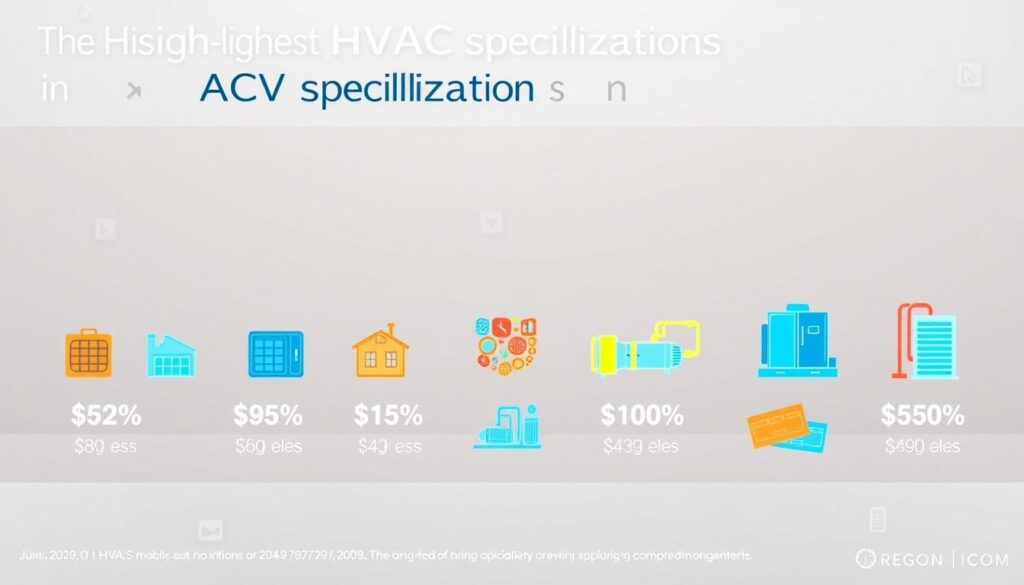Affiliate Disclosure
HVAC Guide Guys is a participant in the Amazon Services LLC Associates Program, an affiliate advertising program designed to provide a means for sites to earn advertising fees by advertising and linking to Amazon.
How Much Do HVAC Techs Make in Oregon? Are you curious about the earnings of HVAC technicians in Oregon? This career offers stability, growth, and good pay in a field that’s key to our comfort and infrastructure.

The hvac technician salary in Oregon is an exciting chance for those who love hands-on work. With an average yearly income of $57,180, knowing how much HVAC techs earn in Oregon can help you decide if it’s right for you.
Oregon’s job market is dynamic, with great opportunities for skilled HVAC pros. Whether it’s for homes or big commercial systems, the need for good technicians keeps growing. This makes it a great career for those who want to use their technical skills and earn well.
Key Takeaways
- Average HVAC technician salary in Oregon is $57,180 annually
- Growing demand for skilled HVAC professionals
- Competitive compensation across different regions
- Opportunities for career advancement
- Diverse work environments in residential and commercial sectors
Table of Contents
Overview of HVAC Technician Salaries in Oregon
Exploring hvac tech pay in Oregon can guide your career in this field. The state offers good wages for HVAC techs. Wages vary by location and experience.
Oregon’s HVAC wages show a wide range of what you can earn. Your pay depends on your skills, where you work, and how long you’ve been doing it.
Average Annual Earnings
HVAC techs in Oregon usually make between $37,120 and $78,430 a year. This range shows the variety of jobs available.
- Entry-level jobs start at $37,120
- Those in mid-career make about $55,000
- More experienced techs can earn up to $78,430
Salary Range Breakdown
| Experience Level | Annual Earnings | Potential Factors |
|---|---|---|
| Entry-Level | $37,120 – $45,000 | Basic certifications, minimal experience |
| Mid-Level | $45,000 – $65,000 | Advanced skills, specialized training |
| Senior-Level | $65,000 – $78,430 | Expert knowledge, complex installations |
Regional Variations Within Oregon
Your pay in Oregon can change based on where you live. Cities like Portland usually pay more because of higher demand and living costs.
- Portland Metro Area: Highest concentration of HVAC jobs
- Southern Oregon: Moderate wage opportunities
- Eastern Oregon: More limited job market
Knowing these salary trends can help you plan your HVAC career in Oregon.
Explore Our HVAC Shop
Looking for top-rated HVAC tools, parts, and accessories? Visit our shop and find the perfect solution for your needs.
Visit the ShopHow Much Do HVAC Techs Make in Oregon Compared to National Averages
Oregon’s HVAC technician salaries are interesting when compared to the rest of the country. The state ranks 19th in the nation for these jobs. This ranking shows Oregon’s competitive pay, influenced by its unique market.
How much you earn as an HVAC tech in Oregon depends on several things. The national average is about $50,590 a year. But in Oregon, technicians make around $57,180, which is more than the national average.
- National Average Salary: $50,590
- Oregon Average Salary: $57,180
- State Ranking: 19th in the United States
This pay difference comes from various factors. These include:
- Regional economic conditions
- Cost of living adjustments
- Local industry demand
- Technological infrastructure requirements
The Pacific Northwest’s strong tech and construction sectors help boost HVAC tech wages. Cities like Portland often have better pay than rural areas. This creates different earning levels across the state.
“Oregon’s HVAC market provides competitive compensation that rewards skilled professionals.” – Industry Experts
Knowing about these salary differences can help you plan your HVAC career in Oregon. By understanding the regional economy, you can aim for higher earnings.
Explore Our HVAC Shop
Looking for top-rated HVAC tools, parts, and accessories? Visit our shop and find the perfect solution for your needs.
Visit the ShopEntry-Level HVAC Technician Salaries in Oregon
Starting a career as an HVAC service tech in Oregon is a great opportunity. It offers a good starting salary for those who want to grow in their field. The salaries for entry-level HVAC jobs in Oregon are attractive for those starting their careers in heating, ventilation, and air conditioning.
Starting Wage Expectations
Entry-level HVAC technicians in Oregon can earn between $35,000 and $45,000 a year. Your salary depends on several things:
- Educational background
- Specific technical certifications
- Geographic location within Oregon
- Initial technical skills
Required Qualifications for Entry-Level Positions
To get a good job in the HVAC field in Oregon, you need to meet certain requirements:
- High school diploma or equivalent
- Vocational training or associate degree in HVAC technology
- EPA certification for handling refrigerants
- Basic technical and mechanical skills
Career Growth Potencial
The salaries for HVAC professionals in Oregon show a lot of room for growth. As you get more experience and certifications, your pay will go up. Entry-level technicians can see their salaries increase by 15-25% in the first three to five years.
Investing in continuous learning and specialized certifications can dramatically improve your career trajectory in the HVAC industry.
Aspiring HVAC technicians should see their first job as a stepping stone. By improving your skills and getting more certifications, you can build a strong and fulfilling career in Oregon’s HVAC job market.
Factors Affecting HVAC Tech Earnings in Oregon
To understand how much an HVAC tech can earn in Oregon, we need to look at several factors. Your salary as an HVAC specialist can change based on a few key things. These factors can really affect how much you make.
Where you work in Oregon matters a lot for your salary. Cities like Portland usually pay more than rural areas. The need for skilled HVAC workers also changes based on the local weather and buildings.
- Certification levels greatly affect how much you can earn
- Having advanced technical skills means you can earn more
- Knowing a lot about specific HVAC systems can increase your value
Being good with new technology is also very important. As HVAC systems get more complex, those who know the latest tech and energy-saving solutions can ask for higher pay.
“In Oregon’s competitive HVAC market, continuous learning is the key to maximizing your earning.” – HVAC Industry Expert
Improving your skills can really help your career. Getting advanced certifications, learning about new green technologies, and knowing a lot about HVAC systems makes you more valuable in Oregon’s job market.
- Working on commercial HVAC systems can pay more
- Doing residential maintenance can give you steady work
- Specialized industrial HVAC jobs can pay the most
The state of the economy and the seasons in Oregon also affect how much HVAC techs make. Summer and winter are usually busier, which means more work and extra pay.
Experience-Based Salary Progression
Understanding how hvac technician salary oregon changes with experience is key to planning your career. The more you know and do, the more you can earn.
Your salary as an HVAC technician in Oregon depends on several things. These include your years of experience, special skills, and where you work.
Junior Level (0-3 years)
At the start, your salary will be lower. Junior-level technicians in Oregon usually make:
- Starting wages between $35,000 – $42,000 annually
- Opportunities for rapid skill development
- Basic certification requirements
Mid-Level (4-8 years)
With more experience, your salary will go up. Mid-level technicians can expect:
- Annual salaries ranging from $45,000 – $60,000
- Advanced technical skills
- Potential for specialization in specific HVAC systems
Senior Level (9+ years)
Experienced HVAC technicians earn the most. Senior-level professionals usually make:
- $65,000 – $85,000 per year
- Leadership and training opportunities
- Expert-level technical expertise
Pro tip: Specializing in complex systems like industrial refrigeration or advanced climate control can significantly boost your earning in Oregon’s HVAC market.
Explore Our HVAC Shop
Looking for top-rated HVAC tools, parts, and accessories? Visit our shop and find the perfect solution for your needs.
Visit the ShopHighest-Paying HVAC Specializations in Oregon

If you’re looking into HVAC jobs in Oregon, knowing the best specializations can boost your pay. Oregon’s HVAC field has many high-paying jobs for skilled techs.
Choosing the right HVAC specialization can greatly affect your salary in Oregon. The most lucrative areas need advanced skills and specific knowledge.
- Commercial HVAC Systems: Technicians working on big commercial projects get high wages
- Industrial Refrigeration: Special cooling systems require more technical know-how
- Energy Efficiency Design: Experts in green HVAC solutions earn more
New technologies are opening up more HVAC jobs in Oregon. Getting into smart building systems and renewable energy can increase your earnings.
| HVAC Specialization | Average Annual Salary | Required Certifications |
|---|---|---|
| Commercial HVAC | $68,500 | EPA Section 608, Advanced Commercial Systems |
| Industrial Refrigeration | $72,300 | RSES Certification, Advanced Refrigeration |
| Energy Efficiency Specialist | $65,900 | LEED Accreditation, Energy Auditor Certification |
To earn more, keep learning and get advanced certifications. The HVAC world values those who keep up with new tech and skills.
Benefits and Additional Compensation
Looking at hvac installer income oregon, there’s more than just a salary. HVAC techs in Oregon get great benefits that add a lot to their earnings.
Healthcare Coverage
Top HVAC companies in Oregon give their techs amazing healthcare benefits. These include:
- Medical insurance with low deductibles
- Dental and vision coverage
- Prescription drug plans
- Preventative care options
Retirement Planning
Oregon HVAC earnings also come with great retirement plans. Companies know how important it is to secure their techs’ future.
- 401(k) matching programs
- Pension plans for long-time employees
- Options to invest in retirement
Performance Bonuses
Top HVAC techs can earn more through bonuses. Great service and efficiency can lead to:
- Quarterly performance bonuses
- Commission structures
- Annual profit-sharing
Knowing about these extra pay options helps HVAC pros make better career choices.
Explore Our HVAC Shop
Looking for top-rated HVAC tools, parts, and accessories? Visit our shop and find the perfect solution for your needs.
Visit the ShopOregon HVAC Job Market Outlook

The HVAC job market in Oregon is changing a lot. There’s a big need for energy-saving systems and new tech. This makes salaries for HVAC pros in Oregon more competitive. With older systems needing updates, your career looks bright.
Some big trends in the Oregon HVAC job market are:
- Projected job growth of 15% over the next decade
- Rising demand for sustainable and smart HVAC technologies
- Increased focus on energy-efficient installations
When looking at hvac service tech pay oregon, many things affect your earnings. Oregon’s push for green energy and sustainable buildings offers great chances for skilled workers.
New areas of focus are opening up more job chances:
- Renewable energy HVAC systems
- Smart home climate control technologies
- Commercial energy management solutions
The Bureau of Labor Statistics shows strong growth for HVAC techs in Oregon. Those who keep up with new tech and get more training will likely see big career boosts and salary increases.
“The future of HVAC in Oregon is not just about maintaining temperature, but creating intelligent, sustainable environments.” – Oregon HVAC Association
Conclusion
Your journey into the HVAC industry in Oregon is promising. It offers good pay and chances for growth. Oregon’s HVAC techs earn competitive wages, making it a great career choice.
The state’s job market is diverse and always looking for skilled workers. This means many chances for those who want to improve their skills.
Starting as an HVAC specialist in Oregon can lead to high earnings. As you gain experience, your pay can increase a lot. The secret to success is learning more, getting certifications, and keeping up with new HVAC tech.
Thinking about a career in HVAC? Remember, your pay depends on your skills and how specialized you become. Oregon’s HVAC industry offers a stable path to making more money. With the right training and dedication, you can reach your full career goals.
An HVAC career in Oregon is a wise choice. It has good job prospects and pay. Your hard work, skills, and education will drive your success in this field.

